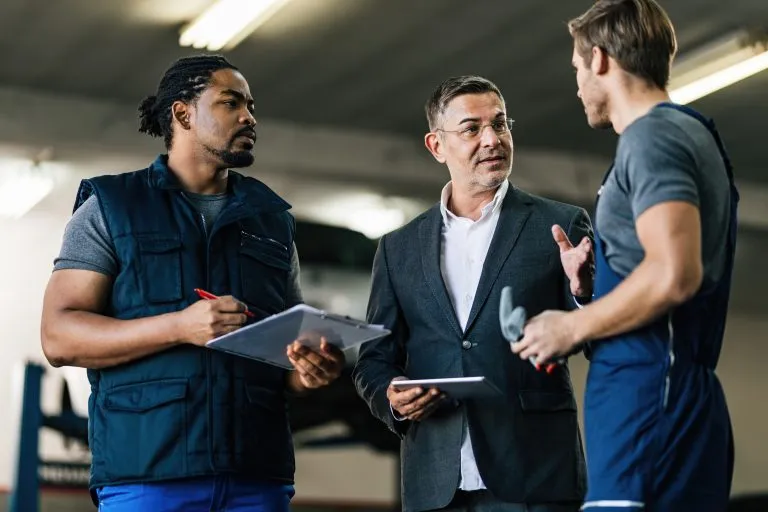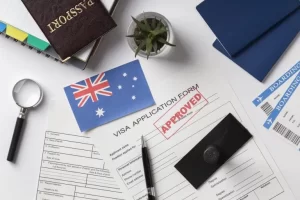Finding skilled tradespeople in Australia’s manufacturing industry has become more than just a routine hiring challenge—it’s a pressing issue. If you’re looking to fill roles like Metal Fabricator, Tool Maker, Metal Machinist (First Class), or Plastics Technician, chances are you’ve already posted on Seek.com or LinkedIn and are getting some responses. But evaluating international candidates brings unique questions, especially if you’re looking for a worker who’ll stick around and become a reliable part of your team.
To make the most of your interview process, it’s important to dig deeper with international applicants. Beyond qualifications, you’ll want to assess their long-term commitment, their readiness to meet Australian standards, and whether they have the skills and mindset needed to make a seamless transition. This guide will help you navigate those conversations with confidence so that you can make the best choice for your business and build a team that truly supports your manufacturing goals.
Absolutely! Here’s a revised version in a more conversational, Marcus Sheridan-inspired tone.
Manufacturing Industry Recruitment: Best Practices for Interviewing International Applicants
Let’s be real: finding top-notch tradespeople in Australia’s manufacturing industry isn’t just a challenge—it’s a full-time job on its own. You’ve posted on Seek.com, maybe even tried LinkedIn, and applications are trickling in. But when it comes to evaluating these international candidates, it’s hard to know where to start.
This is especially true if you’re in manufacturing, where you’re looking for specific skills in roles like Metal Fabricators, Tool Makers, Metal Machinists (First Class), or Plastics Technicians. You need a candidate who isn’t just qualified but also dedicated to staying and contributing long-term. This guide will walk you through key strategies to make the most of your interview process so you can find that ideal hire.
1. Get Clear on Why They Want to Move to Australia
First things first: ask your candidate why they’re interested in coming to Australia. This question will tell you a lot about their long-term plans and whether they’re genuinely committed to building a life here or just looking for a short stint.
In manufacturing, the last thing you want is to invest in an international hire who only plans to stay for a year or two. You’re looking for commitment—someone who’s ready to settle down, grow with your business, and bring stability to your team. So dig a little deeper. Ask about their goals, their career plans, and why Australia. Look for that long-term intent that says they’re here for more than just a job—they’re here to build a future.
2. Know the Requirements: Do They Need a Skills Assessment?
For manufacturing roles, there’s a good chance your candidate may need a skills assessment before they can work in Australia. If you’re hiring for jobs like Metal Fabricator or Tool Maker, a skills assessment can verify that they’re up to Australian standards.
This process is no walk in the park; it requires candidates to prove their experience and technical skills through hands-on assessments. They might have to show their work with specific machinery, demonstrate their ability to troubleshoot, or prove they can meet Australian industry standards. When a candidate already has a positive skills assessment, that’s a huge green flag—they’ve invested time, money, and effort to show they’re serious about working here. Plus, it gives you confidence that their skills are legit and ready for the demands of your workplace.
Want to know if your position needs a skills assessment? You can check requirements on the Department of Home Affairs Skilled Occupation List.
3. Make Sure They Meet English Language Requirements
Good communication isn’t just nice to have in manufacturing—it’s essential. Almost all international workers will need to pass an English test, like the IELTS, which measures how well they can communicate in everyday situations as well as in more technical contexts.
Imagine trying to train a Plastics Technician who struggles with safety instructions or who can’t interpret detailed feedback. It’s a risk to productivity and safety, so make sure they meet the language requirement. And for candidates from specific countries, there may be exceptions to this rule. You can always check for these details on the IELTS website.
4. Get Clear on Who’s Covering Visa Costs
Hiring internationally isn’t cheap. From visa fees to travel expenses, costs can add up. Here’s the thing: when both you and the candidate share the financial responsibility, it shows mutual commitment.
At You Solved, we’ve seen that candidates who are willing to invest in their own visa costs tend to be serious about making the move work. This “skin in the game” approach reduces turnover because they’ve made a real commitment. So, don’t be afraid to bring this up in the interview and confirm how costs will be split. It’s a straightforward way to find out just how serious your candidate is.
5. Incorporate a Practical Skills Test in the Interview
Here’s a tip: when interviewing for roles like Metal Machinists, Tool Makers, or Plastics Technicians, don’t just take their word for it—see them in action. Integrate a practical skills assessment into your interview process.
For example, you could ask them to interpret a technical drawing and explain how they would tackle the job. Or, you might give them a hypothetical troubleshooting scenario and see how they’d solve it. Not only will this reveal their hands-on abilities, but it also shows their problem-solving skills and attention to detail.
This type of skills test is invaluable in manufacturing because it goes beyond words on a resume. It helps you see firsthand if they can do the work, handle the pressure, and meet the demands of your shop floor. Candidates who pass with flying colors are more likely to be dependable hires who can hit the ground running.
Absolutely! Here’s a revised version in a more conversational, Marcus Sheridan-inspired tone.
Manufacturing Industry Recruitment: Best Practices for Interviewing International Applicants
Let’s be real: finding top-notch tradespeople in Australia’s manufacturing industry isn’t just a challenge—it’s a full-time job on its own. You’ve posted on Seek.com, maybe even tried LinkedIn, and applications are trickling in. But when it comes to evaluating these international candidates, it’s hard to know where to start.
This is especially true if you’re in manufacturing, where you’re looking for specific skills in roles like Metal Fabricators, Tool Makers, Metal Machinists (First Class), or Plastics Technicians. You need a candidate who isn’t just qualified but also dedicated to staying and contributing long-term. This guide will walk you through key strategies to make the most of your interview process so you can find that ideal hire.
1. Get Clear on Why They Want to Move to Australia
First things first: ask your candidate why they’re interested in coming to Australia. This question will tell you a lot about their long-term plans and whether they’re genuinely committed to building a life here or just looking for a short stint.
In manufacturing, the last thing you want is to invest in an international hire who only plans to stay for a year or two. You’re looking for commitment—someone who’s ready to settle down, grow with your business, and bring stability to your team. So dig a little deeper. Ask about their goals, their career plans, and why Australia. Look for that long-term intent that says they’re here for more than just a job—they’re here to build a future.
2. Know the Requirements: Do They Need a Skills Assessment?
For manufacturing roles, there’s a good chance your candidate may need a skills assessment before they can work in Australia. If you’re hiring for jobs like Metal Fabricator or Tool Maker, a skills assessment can verify that they’re up to Australian standards.
This process is no walk in the park; it requires candidates to prove their experience and technical skills through hands-on assessments. They might have to show their work with specific machinery, demonstrate their ability to troubleshoot, or prove they can meet Australian industry standards. When a candidate already has a positive skills assessment, that’s a huge green flag—they’ve invested time, money, and effort to show they’re serious about working here. Plus, it gives you confidence that their skills are legit and ready for the demands of your workplace.
Want to know if your position needs a skills assessment? You can check requirements on the Department of Home Affairs Skilled Occupation List.
3. Make Sure They Meet English Language Requirements
Good communication isn’t just nice to have in manufacturing—it’s essential. Almost all international workers will need to pass an English test, like the IELTS, which measures how well they can communicate in everyday situations as well as in more technical contexts.
Imagine trying to train a Plastics Technician who struggles with safety instructions or who can’t interpret detailed feedback. It’s a risk to productivity and safety, so make sure they meet the language requirement. And for candidates from specific countries, there may be exceptions to this rule. You can always check for these details on the IELTS website.
4. Get Clear on Who’s Covering Visa Costs
Hiring internationally isn’t cheap. From visa fees to travel expenses, costs can add up. Here’s the thing: when both you and the candidate share the financial responsibility, it shows mutual commitment.
At You Solved, we’ve seen that candidates who are willing to invest in their own visa costs tend to be serious about making the move work. This “skin in the game” approach reduces turnover because they’ve made a real commitment. So, don’t be afraid to bring this up in the interview and confirm how costs will be split. It’s a straightforward way to find out just how serious your candidate is.
5. Incorporate a Practical Skills Test in the Interview
Here’s a tip: when interviewing for roles like Metal Machinists, Tool Makers, or Plastics Technicians, don’t just take their word for it—see them in action. Integrate a practical skills assessment into your interview process.
For example, you could ask them to interpret a technical drawing and explain how they would tackle the job. Or, you might give them a hypothetical troubleshooting scenario and see how they’d solve it. Not only will this reveal their hands-on abilities, but it also shows their problem-solving skills and attention to detail.
This type of skills test is invaluable in manufacturing because it goes beyond words on a resume. It helps you see firsthand if they can do the work, handle the pressure, and meet the demands of your shop floor. Candidates who pass with flying colours are more likely to be dependable hires who can hit the ground running.
Wrapping Up: Make the Most of Your Manufacturing Interview Process
Hiring internationally for manufacturing roles isn’t something you want to rush. By asking about their long-term intentions, verifying their skills, assessing their communication abilities, and setting clear expectations on costs, you’re not just filling a role—you’re bringing in someone who can make a real impact on your team.
International hiring can be the answer to filling those hard-to-staff roles, but it all comes down to finding the right fit. These best practices will help you find someone who not only has the technical skills you need but is also committed to growing with your business. And when you’ve found that person, you’ll know you’ve made a hire who can take your manufacturing operation to the next level.
Expanding your workforce internationally can be a strategic move for your regional business. The process of hiring internationally comes with its own set of challenges and considerations. To help you navigate this process seamlessly, I’ve compiled the ultimate checklist for regional employers looking to hire internationally. This could save you time and money and mitigate your risk of a dud candidate or expensive visa refusal.
For hassle-free expert guidance on navigating the international hiring and migration process, reach us here at You Solved. With the right support, you’ll build a workforce that’s skilled, committed, and ready for the demands of Australia’s manufacturing industry.








